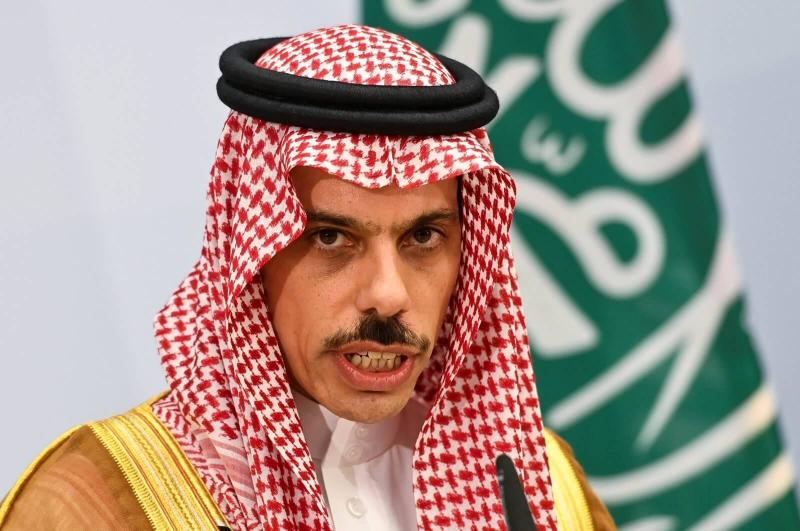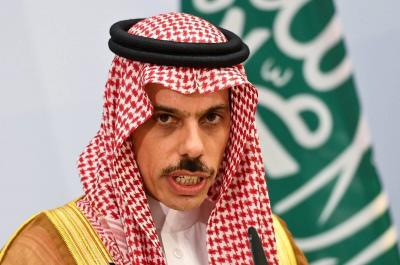Saudi Foreign Minister Faisal bin Farhan indicated that he looks forward to meeting his Iranian counterpart, Hossein Amir-Abdollahian, "soon," emphasizing that the agreement to resume diplomatic relations between Riyadh and Tehran reflects a mutual desire for dialogue, but does not mean resolving all differences between the two countries. In a press interview, bin Farhan stated, "We are preparing to resume diplomatic relations between our two countries within the next two months, and it is natural that in the future we exchange visits."
Riyadh and Tehran agreed in Beijing last Friday to resume their severed relations since 2016 and to reopen their embassies within two months. Regarding his recent visit to Kyiv and Moscow and discussions about Saudi mediation to end the Ukraine-Russia war, bin Farhan confirmed Riyadh's readiness "to make good efforts and work with both countries to reach a political solution that ends the crisis, halts the fighting, and saves lives," stressing the need to stop the escalation that has harmed both countries, Europe's security, and weakened international cooperation.
When asked whether the agreement contributes to starting a new political and economic phase in the region, bin Farhan pointed out that "the essence of international relations is the existence of diplomatic relations between countries, which is enhanced when two neighboring countries like the Kingdom of Saudi Arabia and the Islamic Republic of Iran share several religious, cultural, historical, and civilizational ties."
He clarified that the agreement was reached under Chinese sponsorship and mediation after two years of discussions in Iraq and Oman, affirming that "Saudi Arabia is moving forward in the path of de-escalation and reducing tensions, feeling its role and responsibility in promoting regional and international security and stability." He stated, "We in the Kingdom hope to open a new chapter with Iran and enhance prospects for cooperation that positively reflect on establishing security and stability and driving the wheels of development and prosperity, not just in our two countries but in the entire region."
On the possibility of a forthcoming visit to Tehran, he expressed, "I look forward to meeting the Iranian Foreign Minister soon based on what was agreed upon, and we will prepare to resume diplomatic relations between our countries within the next two months. It is natural that we exchange visits in the future." He stressed that "one of the most important requirements for opening a new chapter with Iran is to adhere to what has been agreed upon between both parties, as stipulated in the contents of the trilateral Saudi-Iranian-Chinese statement."
Without a doubt, he stated, "The interests of our countries and the region lie in activating paths of cooperation and joint coordination, focusing on development priorities instead of considerations of dominance, leading to the realization of the aspirations and hopes of our peoples and the youth of our region for a better future marked by security, stability, and prosperity. We hope that the Iranian side shares the same goals and aspirations, and we look forward to working with it to achieve that."
When asked whether the agreement between the two countries represents a lifeline for the Iranian regime, he remarked, "Iran is a neighboring state, and its stability and development serve the interest of stability and development in the region as a whole. We in Saudi Arabia wish nothing but good for it." Regarding Iran's continued development of its nuclear capabilities, he acknowledged it concerns them, reiterating their call for the Gulf region and the Middle East to be free of weapons of mass destruction. He urged Iran to commit to fulfilling its nuclear obligations and to intensify its cooperation with the International Atomic Energy Agency, stating that they will continue to work with allies and friends to ensure that.
About accepting the Chinese mediation, he noted, "As stated in the joint statement, Saudi Arabia welcomed the initiative proposed by His Excellency the President of the People's Republic of China, Mr. Xi Jinping, and interacted with it as an extension and continuation of the negotiations that have been ongoing with the Iranian side for two years. It is well-known that China has positive relations with both parties, which contributed to bridging viewpoints and highlighting the Kingdom's legitimate concerns."
The Saudi Foreign Minister expressed hope that "China's sponsorship of the agreement would contribute to enhancing coexistence and mutual security in our region and the relations of good neighborliness between the countries. The three countries have a shared interest in creating a regional environment characterized by peace, security, and stability, to build and develop regional and international partnerships that provide the necessities for development and economic prosperity for the peoples and countries of the region."
Regarding the Saudi initiative to end the Ukrainian conflict, he said, "We have been and remain ready to make good efforts and work with both countries to reach a political solution that ends the crisis, halts the fighting, and saves lives. The efforts of His Royal Highness Prince Mohammed bin Salman, Crown Prince and Prime Minister, have successfully resulted in a deal for prisoner exchange between the two parties, leading to the return of citizens from ten countries to their homelands."
He pointed out that the Kingdom emphasized "the importance of meeting urgent humanitarian needs affected by the continuation of the war, and our humanitarian aid to Ukraine came in response to that. The situation requires both parties and the entire international community to stop the grave escalation that has harmed both countries, Europe's security, and weakened the level of international cooperation."




